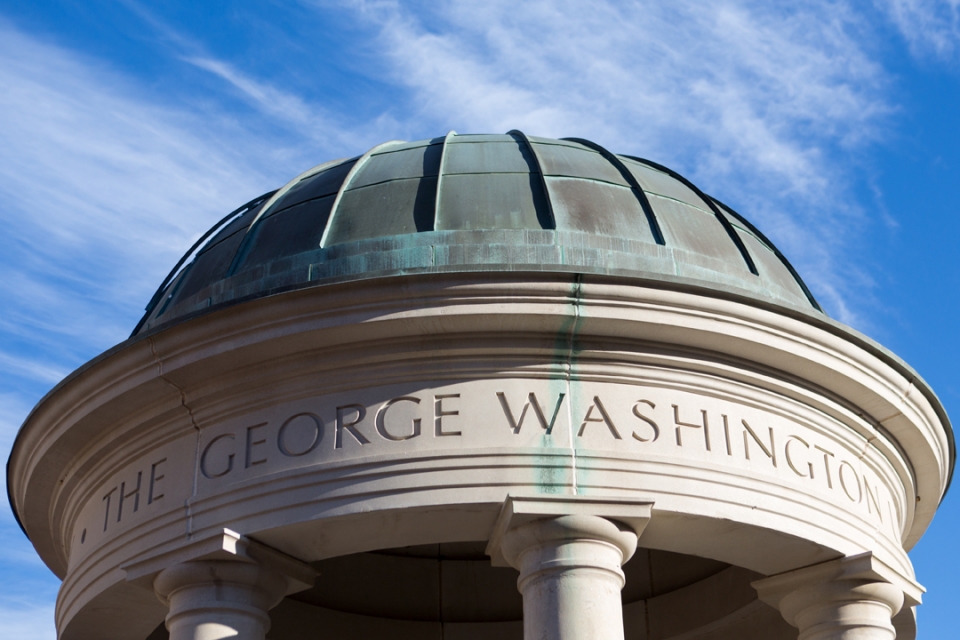Four groups of George Washington University faculty, staff and leadership convened Friday to begin a review of the university’s “research ecosystem”—the entirety of GW’s research efforts, including priorities, programs, policies, infrastructure and facilities.
The review is a major goal of the university’s research strategic initiative and aims to identify successes and areas for investment and to outline action plans for improvement.
“Bringing together these working groups is a crucial step toward comprehensively understanding how we support our faculty and student research—what we are doing well and where we can improve,” said Vice President for Research Robert Miller. “Hearing directly from our stakeholders will greatly inform our priorities and provide a baseline as we work together to grow GW as a highly respected research institution.”
The teams that gathered Friday represent the first phase of working groups that will meet throughout the fall semester, examining pre-award processes; post-award processes; research integrity and compliance; and non-sponsored research and scholarship. To choose the working group participants, research initiative leadership and members of the Faculty Senate Committee on Research sought suggestions from schools for faculty, staff and administrators who would provide broad representation and expertise to each group.
Ultimately, the groups will present findings to the Faculty Senate Committee on Research and a report with their collective recommendations will be submitted to university leadership in early 2019.
“I am pleased that our faculty are deeply engaged in the ecosystem review process,” said Provost Forrest Maltzman. “This initiative is one in which faculty involvement is critical and will provide the university with the guidance we need to best support our research goals.”
Three additional working groups will launch at a later date to focus on operation and utilization of research core facilities; building of big data and high-performance computing infrastructure; and postdoctoral recruiting and hiring. Faculty and administrators will be recruited to serve on these groups as part of a second phase of the research ecosystem review.
Members of the university community who would like to provide feedback to any of the working groups below may contact the working group leaders directly or send a message through the form on the research strategic initiative website.
The phase one groups, charges and working group leaders include:
Pre-Award Processes
This group will review the processes at work leading up to applying for a research grant, such as finding funding opportunities and collaborators, developing a budget, submitting necessary paperwork and routing proposals for review and approval before submission to the prospective funding organization.
Group leader:
Melissa Perry, professor and chair of Environmental and Occupational Health (Milken Institute School of Public Health)
Post-Award Processes
After a researcher receives a grant, a number of requirements accompany it, including administrative work in the university’s systems and monitoring the research and spending to ensure compliance with the award sponsor. Researchers also may need to hire and oversee staff or student researchers, or contract out some of the research to other collaborators. This group will review the processes related to these areas.
Group leader:
Matt Kay, professor of engineering and applied science (School of Engineering and Applied Science)
Research Integrity and Compliance
This group will examine the training and oversight that promotes ethical research and scholarly conduct to ensure compliance with applicable laws and policies. Research integrity and compliance includes human and animal research, laboratory safety, data use agreements, export controls, conflicts of interest and responsible conduct of research issues.
Group leader:
Kim Acquaviva, professor of nursing (School of Nursing)
Non-Sponsored Research and Scholarship
Some types of research and scholarship, such as in the arts, humanities and social sciences, may have limited external funding opportunities. This group will examine ideas for how to support non-sponsored research and scholarship as well as identify and quantify outcomes such as fellowships, publications or other means of recognition in these areas.
Group leader:
Jamie Cohen-Cole, associate professor of American studies (Columbian College of Arts and Sciences)
The full membership of the working groups can be found on the research strategic initiative website.




